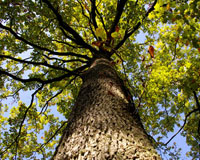| . |  |
. |
Washington DC (SPX) Feb 04, 2010 Not all plantations need to be the biological deserts that have come to characterize large-scale, industrial plantations. According to scientists in a paper out in February's issue of the journal Frontiers in Ecology and the Environment, well-planned plantations can actually alleviate some of the social, economic and ecological burden currently being placed on natural forests. In addition, these biologically diverse, multi-purposed plantations can mitigate climate change by sequestering carbon, off-setting deforestation and reducing ecological strain on natural forests. "Forest plantations have acquired a bad reputation," says Alain Paquette from the Universite du Quebec � Montreal, who co-authored the study with colleague Christian Messier. "But not all plantations are so-called 'biological deserts.' We believe that plantations have a legitimate place in the sound management of forests, and our aim is to provide some basis for an open discussion and to promote the use of well-conceived plantations." The researchers looked at the types of plantations currently in use, the benefits and challenges associated with each and the best methods for creating the greatest social, economic and environmental return. For example, the authors examined the constraints plantations place on protecting natural forests, mitigating the effects of climate change and restoring ecological services. In terms of the protection of natural forests, the researchers found that plantations were capable of alleviating the ecological stressors placed on natural forests when used within an integrated forest zoning approach-that is, when rules are enforced to ensure any increase in plantations is matched by protected areas within the same landscape. "We have to look beyond the rows of uniform trees and evaluate plantations over larger temporal and spatial scales," says Paquette. "Well-planned, multi-purposed plantations can help preserve high diversity, old-growth forests that would be cut otherwise." As for climate change, the authors reference a direct link between climate change and deforestation: land-use change accounts for roughly 25 percent of global greenhouse-gas emissions. In order for plantations to help limit the effects of climate change, the researchers contend, nations need to address the current economic demand for dead trees over live ones. The researchers argue that, although even industrial monocultures can produce meaningful ecological services when managed correctly, "we can do better locally by using biologically diverse, multi-purposed plantations," says Paquette. "Theory and experimental works suggest that even more services could be produced with carefully chosen mixtures of species to promote the optimal use of resources." In contrast to the common perception of plantations as biological deserts, the researchers describe the necessary elements for a well-planned, biologically-diverse plantation system. By improving plantation design through, among other methods, less intensive soil preparation, mixed-species vegetation and greater tolerance of other species in long-term maintenance, the authors believe that such plantations can deliver social, economic and environmental services similar to that of natural forests. As a follow-up to their research, Paquette and colleagues are testing the potential benefits of allocating a small proportion of land over a one million hectare territory in eastern Canada to well-planned, multi-purposed plantations. "Our goal is to use low intensity forestry practices and increase the proportion of protected land in the area," Paquette says. "We hope our model will support the practical applications of well-planned, biologically-diverse plantations worldwide."
Share This Article With Planet Earth
Related Links Ecological Society of America Forestry News - Global and Local News, Science and Application
 Ecologists Discover Forests Are Growing Faster
Ecologists Discover Forests Are Growing FasterWashington DC (SPX) Feb 04, 2010 Speed is not a word typically associated with trees; they can take centuries to grow. However, a new study to be published the week of Feb. 1 in the Proceedings of the National Academy of Sciences has found evidence that forests in the Eastern United States are growing faster than they have in the past 225 years. The study offers a rare look at how an ecosystem is responding to climate change. ... read more |
|
| The content herein, unless otherwise known to be public domain, are Copyright 1995-2010 - SpaceDaily. AFP and UPI Wire Stories are copyright Agence France-Presse and United Press International. ESA Portal Reports are copyright European Space Agency. All NASA sourced material is public domain. Additional copyrights may apply in whole or part to other bona fide parties. Advertising does not imply endorsement,agreement or approval of any opinions, statements or information provided by SpaceDaily on any Web page published or hosted by SpaceDaily. Privacy Statement |